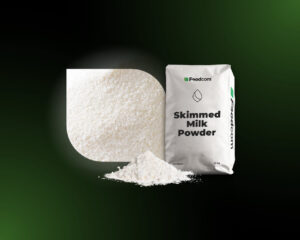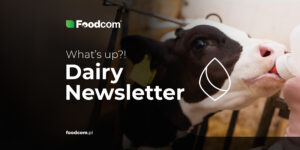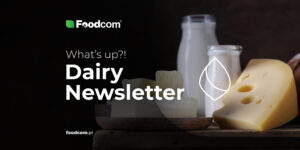- Prices for mozzarella have risen across Europe, as reflected in the latest GDT results.
- There has been a significant increase in inquiries for WPC products, reflecting growing interest and demand in this sector.
- Exporters such as Poland must look for new markets as competition, such as from Belarus, which subsidizes its dairy production, becomes more intense.Brazil is positioning itself as a leader in the emerging market for alternative proteins with the introduction of Law 3357/2024, which establishes rules for the production and commercialization of cell-cultured foods.
Welcome to Partners!
Welcome back to our newsletter!
Global dairy markets are experiencing significant changes, with rising prices due to limited supply and increasing demand. Key products such as skimmed milk powder (SMP), cheese and butter are seeing price increases, with the cheese sector being particularly strong. External factors, such as China’s reduction in dairy imports and Brazil’s emphasis on alternative proteins, are adding to the complexity of the market. Exporters now face increased competition and are looking for new opportunities as global demand patterns evolve.
Let’s see what else has happened recently in the dairy market!
Skimmed milk powder
In the food sector, skimmed milk powder (SMP) prices are on the rise, with current levels at €2,500/MT or higher. Futures are quoted in the range of EUR 2600-2700/MT and, based on concentrate prices, powder costs are expected to exceed EUR 2700-2800/MT.
The market for skimmed milk powder (SMP) for feed continues to strengthen, with wholesale DAP prices in the Netherlands reaching €2550-2580/MT in Q4 2024. As of Q1 2025, transactions above €2600/MT have been recorded, reflecting the continued strengthening of the market.
Recent trends on the Global Dairy Trade (GDT) platform indicate an increase in prices for both SMP for food and buttermilk powder, while the largest decreases were seen for lactose and whole milk powder. Furthermore, there are rumours that the Baltic States may stop drying SMP in the coming months, which could further reduce supply. Given these developments, we expect further price increases in the coming weeks.
Cheese
The cheese market is showing considerable strength, with spot prices for Gouda and Mozzarella at or above €4500/MT. Offers for Q4 start at €4650-4700/MT, although securing offers is becoming increasingly difficult. Mozzarella prices have also increased across Europe, as reflected in the latest GDT results. Additionally, Cheddar is trading above Gouda and Mozzarella, with a recent spot deal at €4800/MT.
The Cagliata cheese market remains tight, with limited availability causing prices to surge. This shortage puts additional pressure on cheese prices, contributing to the overall strength in the market.
Fats
Butter prices remained above €7800/MT FCA, with fourth quarter transactions in the €7800-7900/MT range. However, reaching a price of EUR 8000/MT remains a challenge. Based on current cream prices, butter should theoretically cost above EUR 8200/MT, suggesting that further upward pressure may be coming.
There have been more offers for butter in the market this week and trading activity has calmed down, indicating a more stable environment. Both butter and anhydrous milk fat (AMF) are holding steady, reflecting a balanced market without significant volatility at this time.
Liquids
Cream prices were relatively stable this week, trading at €9700-9800/MT FCA Germany. Reports of prices above EUR 10,000/MT probably refer to delivery prices and not FCA. The market remains stable, but no significant upward movement has been observed.
Skimmed milk concentrate prices are also firming up, with current offers around EUR 2450-2550/MT FCA. The upward trend highlights strong demand in the dairy sector and further price increases are likely if supply remains tight.
Spot milk prices have increased this week, with reports pointing to levels of €60/100 kg or higher. Despite a slight increase in EU milk supply compared to last year, seasonal declines in milk consumption and lower milk content, influenced by bad weather, silage quality and bluetongue, are contributing to price increases.
Whey powder
The market for sweet whey powder (SWP) for bulk feed showed significant strengthening, with prices in the Netherlands in Q4 2023 ranging between €900-920/MT. Looking ahead to Q1 2025, prices are expected to increase further to EUR 925-935/MT. The upward trend indicates strong demand and a potential supply constraint.
In addition, WPC 80 regular prices in the European Union are currently above EUR 10 200/MT, while WPC 80 instant prices are approaching EUR 11 000/MT. There has been a significant increase in enquiries for WPC products, reflecting the growing interest and demand in this sector.
What else?
China and Ukraine
As food production, including dairy, expands, China will import less and less products from abroad, leading to a decline in export contracts in the Chinese market. Exporters such as Poland need to look for new markets as competition, such as from Belarus, which subsidises its dairy production, becomes more intense. In the context of access to the Chinese market, the question of access to the European market for Chinese electric cars should also be considered.
South America
Brazil is positioning itself as a leader in the emerging market for alternative proteins with the introduction of Law 3357/2024, which establishes rules for the production and commercialisation of cell-cultured foods. Promoted by Congressman Jorge Goetten, this legislative move could threaten the struggling dairy industry, already burdened by high production costs and rising imports. While the bill is being celebrated by supporters such as the Good Food Institute as a step towards sustainability, it raises concerns for local dairy producers who may face increased competition from these new, potentially cheaper and more sustainable alternatives.
![Shrinking supply drives up dairy market prices [234th Edition of Foodcom DAIRY Newsletter] Shrinking supply drives up dairy market prices [234th Edition of Foodcom DAIRY Newsletter]](https://foodcom.pl/wp-content/uploads/2024/06/Foodcom_SA_Dairy_Newsletter_3-1520x760.jpg)





